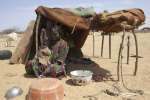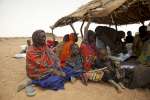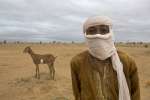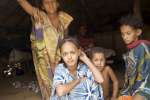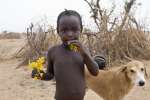- Text size
 |
|  |
|  |
| 
- Français
Malian refugees take part in presidential election
News Stories, 29 July 2013
GOUDEBOU, Burkina Faso, July 29 (UNHCR) – Hundreds of Malian refugees voted in exile at the weekend in the presidential election in their home country, way down on the numbers eligible to cast a ballot.
All told, almost 7 million Malians were eligible to vote for the 27 candidates contesting Sunday's election, the first since conflict erupted in Mali in January last year between government forces and various rebel groups, who were beaten earlier this year following the military intervention of France.
Almost 10,300 of the 173,000 refugees in the neighbouring countries of Burkina Faso, Niger and Mauritania were on the civil registry and eligible to vote. Only about 1,220 voted on election day with humanitarian and practical help from UNHCR and the host countries, but final figures will not be available for several days.
Many of those who did vote said they saw it as a unique opportunity to help bring a brighter future to Mali and pave the way for their eventual return in safety. "These elections bring hope for us Malian refugees, because we have lost so much and a new elected president could help alleviate our suffering," said 45-year-old Aminata, one of the 323 refugees to vote in Niger.
But some others were frustrated by administrative and bureaucratic obstacles they encountered. These led to many being excluded from casting their vote. To vote, eligible refugees needed to present a biometric ID card (NINA card) with their details. They also needed documentation showing their names and photographs on the electoral lists. Many had one or the other, but not both.
"I registered with the Malian authorities when they came to the camp in June, and my name was found on the civil registry but I never received my NINA card," said a disappointed Rhissa, aged 23, in Burkina Faso's Goudebou camp.
Determined to vote, some refugees travelled directly to Mali to collect their NINA cards – like Jarrou Ag Ahmed, who fled to Burkina Faso from Gossi in northern Mali with his wife and nine children in January 2012.
"I drove back to Gossi on my motorcycle last week to check on my shop and the authorities gave me 19 NINA cards to distribute to the appropriate refugees in Goudebou camp," he explained. "The trip took me a day-and-a-half each way. On Sunday, he and his wife proudly voted at a polling station near the camp. They both hope the election of a new president will restore security and political stability in Mali.
Ibrahima was not as lucky. The 24-year-old received the news that his NINA card was with his parents in the northern Mali town of Kidal. "But it was just too dangerous for me to return there to collect it," he said, referring to recurrent instability in the city over the past few months.
But the head of UNHCR's office in the northern Burkina Faso town of Dori said that even though many refuges had not voted, it was an important moment for those who were able to cast their ballot.
"These elections are important for the Malian refugees, they feel it is a right and a duty for them," said Marie Louise Kabre. "It is also a sign of renewal, a sign of reconciliation in Mali. Refugees were ready to vote, they got mobilized very early in the morning to be able to vote."
In Mauritania, only 811 Malian refugees voted on Sunday out of the more than 8,500 who were identified on the electoral database. In Burkina Faso, out of 1,014 refugees whose names were confirmed on the civil registry, only 85 in the end voted.
UNHCR's role in these elections was strictly humanitarian and non-political. The agency informed refugees about the electoral process, facilitated their participation and helped ensure the voluntary nature of the electoral process in a safe environment.
By Hélène Caux in Goudebou, Burkina Faso. Dalia Al Achi in Mauritania and Amaria Belaskri in Niger contributed to this article.














